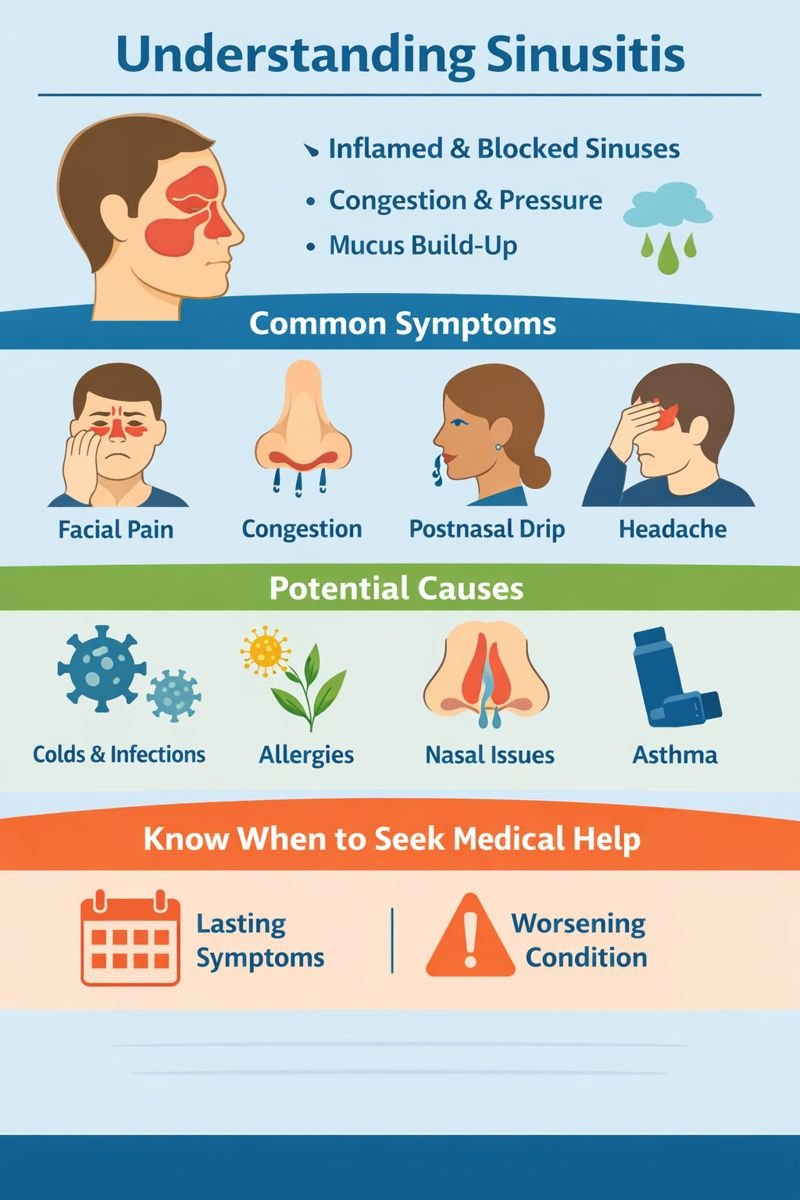Sinusitis: Causes, Symptoms, and First Aid Awareness in Canadian Workplaces
Sinusitis is a condition involving inflammation of the sinuses—the air-filled spaces behind the cheeks, forehead, and nose. When these spaces become swollen or blocked, mucus does not drain properly, which can lead to pressure, congestion, and discomfort. Sinusitis affects people of all ages and is commonly linked to colds, allergies, or ongoing nasal irritation.
In Canada, sinus-related symptoms are a frequent reason people miss work or struggle with concentration, especially during cold and flu season or allergy-heavy months.
First Aid & Workplace Relevance (Canada)
In workplaces such as offices, warehouses, schools, healthcare settings, and food service environments, sinus symptoms can affect comfort, alertness, and attendance. While sinusitis is not usually a workplace emergency, first aid awareness helps workers recognize when symptoms may be more than a simple cold and when additional support or medical assessment may be needed.
Cold indoor air, dust exposure, seasonal allergens, and shared workspaces can all contribute to nasal and sinus irritation, making sinus-related issues relevant across many Canadian work environments.
Scenario: First Aid Awareness in Action
During a busy winter shift, a retail supervisor noticed an employee struggling with facial pressure, congestion, and fatigue for over a week. Remembering first aid training on common illnesses, the supervisor encouraged the employee to take scheduled breaks, stay hydrated, and monitor symptoms rather than pushing through discomfort. The employee later sought medical assessment, helping prevent worsening symptoms and prolonged absence from work.
Symptoms of Sinusitis

-
Nasal congestion or stuffiness
-
Thick or discoloured nasal discharge
-
Postnasal drip (mucus draining down the throat)
-
Facial pressure or tenderness, especially around the cheeks or forehead
-
Headache, often worse when bending forward
-
Tooth or jaw discomfort
-
Cough, particularly at night
-
Fatigue or general feeling of unwellness
-
Reduced sense of smell
-
Fever (in some cases)
Symptoms can vary in severity and may overlap with those of the common cold or allergies.
Causes and How Sinusitis Develops
Sinusitis occurs when swelling blocks normal mucus drainage. Several factors can contribute, including:
-
Viral infections, such as colds
-
Bacterial infections, which may develop after a viral illness
-
Allergies, leading to ongoing nasal inflammation
-
Asthma, which is often linked with chronic sinus inflammation
-
Structural differences, such as a deviated nasal septum, narrowed sinus openings, or nasal polyps
-
Weakened immune function, making it harder to clear infections
When swelling blocks the tiny hair-like structures (cilia) that normally move mucus, fluid becomes trapped in the sinuses, creating pressure and discomfort.
First Aid Awareness and General Management
From a first aid and public education perspective, sinusitis management focuses on comfort, monitoring, and recognizing when symptoms are persistent or worsening. General awareness includes:
-
Supporting rest and hydration
-
Encouraging symptom monitoring over several days
-
Recognizing that symptoms lasting longer than expected may need medical assessment
-
Understanding that not all sinus symptoms are bacterial or require antibiotics
First aid training emphasizes observation and early response rather than treatment decisions.
Prevention and Workplace Considerations
Workplace and everyday steps that may help reduce sinus irritation include:
-
Managing indoor air quality and ventilation
-
Reducing exposure to dust, mold, and strong scents
-
Practicing good hand hygiene to limit the spread of respiratory infections
-
Supporting allergy awareness during high-pollen seasons
-
Encouraging workers to stay home when experiencing significant respiratory illness
These measures support overall respiratory health and workplace safety.
Frequently Asked Questions
Is sinusitis the same as a common cold?
Sinusitis and the common cold share symptoms, but sinusitis involves inflammation and blocked sinus drainage, often lasting longer or causing facial pressure.
Can allergies trigger sinusitis?
Yes. Allergies can cause ongoing nasal swelling, which may block sinus drainage and contribute to sinus symptoms over time.
How is sinusitis different from rhinitis?
Rhinitis affects only the nasal passages and is often allergy-related, while sinusitis involves the sinuses and can cause facial pressure and pain.
Can sinus problems affect work performance?
Ongoing congestion, headaches, and fatigue can reduce concentration and comfort, especially in physically demanding or customer-facing roles.
When should symptoms be checked by a healthcare professional?
If symptoms are persistent, worsening, or significantly interfering with daily activities, medical assessment may be appropriate.
Educational Note
This article is intended for general public education and first aid awareness. It does not replace professional medical assessment, diagnosis, or treatment. First aid training focuses on recognition, support, and knowing when further care may be needed.
